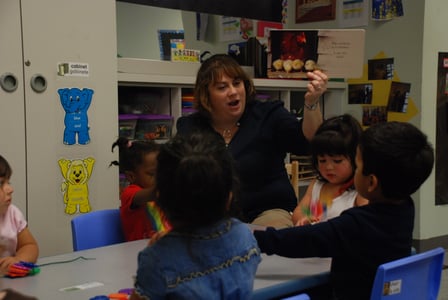
A language-rich environment is vital to children’s early learning and social-emotional development. A language-rich environment isn’t just a room with books and a variety of print; it’s a room where children hear and participate in talking, singing, and reading.
Recent research from MIT has shown that not just language but an intentional conversation between an adult and a child is what can actually develop the child’s brain. Many children hear mostly directions—like “sit down” and “line up”—which don’t provide the opportunity to engage in a conversation. Try these strategies to improve Language Modeling and engage all children in rich conversations that will prepare them to be readers, writers, and thinkers.
1. Engage
-
Get down on the child’s physical level (by kneeling, for example).
-
Listen to what the child says or pay attention to what they are doing or pointing at.
-
Observe the child’s facial or body expressions.
2. Encourage Conversations
-
Comment on what the child is doing and wait for a response.
-
“You like the trains. You’re working hard to build a large train track.”
-
Ask questions about what the child is doing or plans to do.
-
“What are your plans for those blocks?”
3. Extend Language and Learning
-
Repeat what the child says then add a little bit more or a new vocabulary word.
-
Label or describe:
-
Child: I like it.
-
Teacher: You like juicy peaches.
-
Provide more information:
-
Child: [Pointing outside] Dark!
-
Teacher: The sky is dark. It looks like it may rain soon.
-
Help make connections between what is happening in the classroom and what is happening in homes or communities.
-
“What does this remind you of?”
-
“You like playing with the stuffed animals. Do you have any animals at home?”
|
Instead of this … |
Try this! |
|
Adult: Eat your lunch. |
Adult: What are you having for lunch? |
|
Adult: Are you playing in the kitchen? Child: Yes. Adult: What are you cooking? Child: Noodles. Adult: Yum. |
Adult: What will you do in the kitchen today? |
Want more tools to help children's language development? Explore Teachstone's Literacy Support Kits available for pre-K and Kindergarten classrooms. The kit includes classroom materials, books, and guidance that support early reading skills. We also offer a Literacy-at-Home Kit to bring the power of intentional interactions to your program's family engagement efforts.

